Detailed photos capture exploded sports cars
Classic sports cars appear to be frozen as they explode in this series of images by Swiss artist Fabien Oefner (+ slideshow).
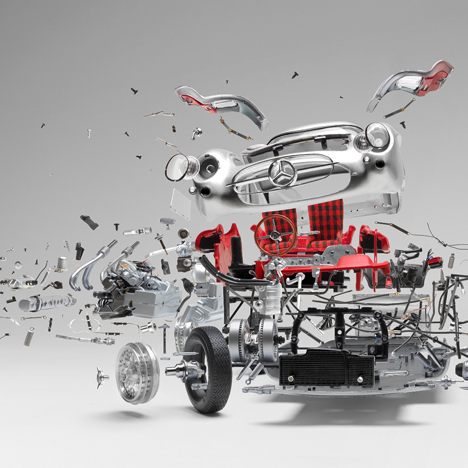
Oefner deconstructed scale models of 1950s and 1960s sports cars and photographed the parts individually. He then digitally arranged them to create an image that makes it look as if a life-sized car is exploding.
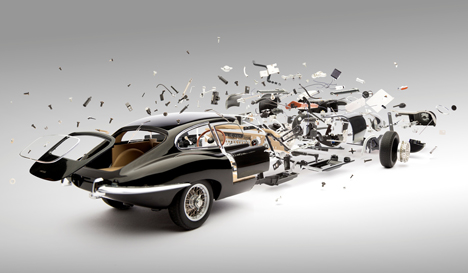
"What you see in these images, is a moment that never existed in real life," said Oefner. "What looks like a car falling apart is in fact a moment in time that has been created artificially by blending hundreds of individual images together."
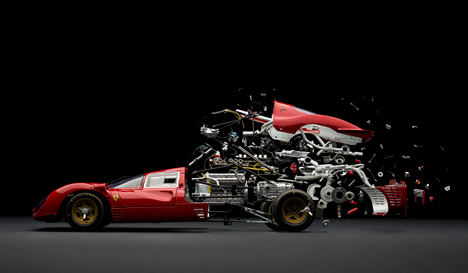
The artist sketched where the individual parts would be placed before each model, containing over a thousand components, was taken apart piece by piece. Titled Disintegration, the series includes a 1954 Mercedes-Benz 300 SLR Uhlenhaut Coupé, a 1961 Jaguar E-Type and a 1962 Ferrari 250 GTO.
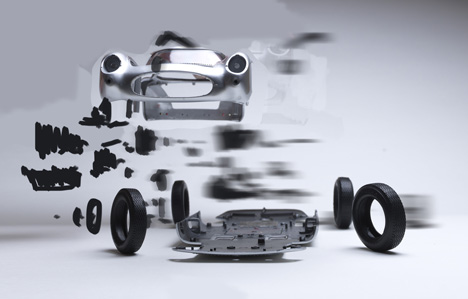
To set up the shots, Oefner arranged the pieces with fine needles and string to create the right angle. He photographed each of the components then combined the pictures to form a single image using Adobe Photoshop.
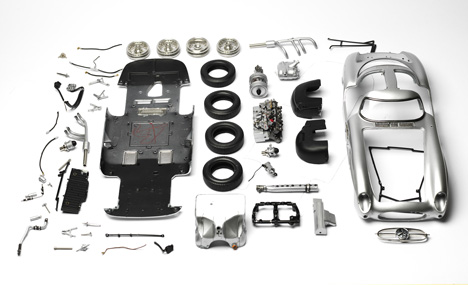
"These are possibly the slowest high-speed images ever captured," he said. "It took almost two months to create an image that looks as if it was captured in a fraction of a second. The whole disassembly in itself took more than a day for each car due to the complexity of the models. But that's a bit of a boy thing. There's an enjoyment in the analysis, discovering something by taking it apart, like peeling an onion."
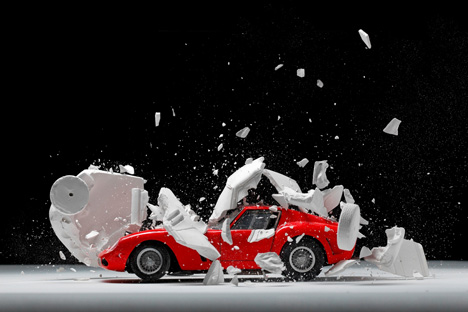
The photographs are currently on display at the M.A.D Gallery in Geneva, Switzerland, along with another series by Oefner called Hatch. This set features images in which a 1967 Ferrari 330 P4 appears to have just broken out of a shell like an egg hatching.
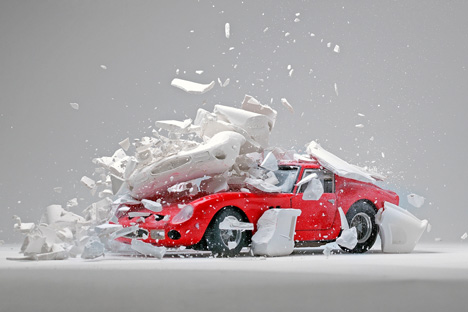
These images of "the birth of a car" were created by filling a latex mould of the model Ferrari with a layer of gypsum to produce a series of shells. The shells were thrown at the model or dropped on top of it, with the aim of capturing the smashing so the car looks like it is breaking out from it. A microphone was connected to the camera to trigger the shutter to close at the exact moment of the shell breaking.
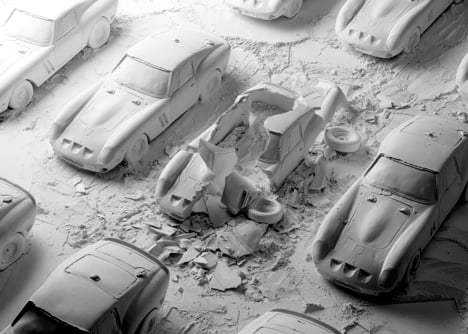
"I have always been fascinated by the clean, crisp looks of 3D renderings," said the artist. "So I tried to use that certain type of aesthetic and combine it with the strength of real photography. These images are also about capturing time: either in stopping it as in the Hatch series or inventing it as in the Disintegrating series."
The exhibition continues until May 2014. Here is some more information from the artist:
Mind-blowing images by Fabian Oefner at the MB&F M.A.D. Gallery The MB&F M.A.D. Gallery is delighted to present a series of prints by Swiss artist Fabian Oefner. Fabian has carved out his reputation by fusing the fields of art and science, creating images appealing to heart and mind. He is constantly on the lookout for capturing life moments that are invisible to the human eye: phenomena like sound waves, centripetal forces, iridescence, fire and even magnetic ferrofluids, among others. The artworks on display at the M.A.D. Gallery from Fabian's series are mind-boggling. The three images of the Disintegrating series are exploded views of classic sports cars that Fabian has painstakingly created by deconstructing vintage roadster scale-models, photographing each component, piece by piece in a very specific position, to create the illusion of an exploding automobile.
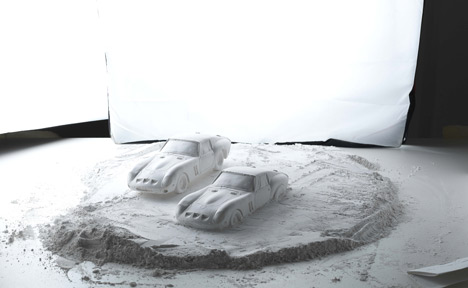
The three other images on exhibition form his Hatch series, which explores the theme 'the birth of a car'. Inspired by a picture of a hatching chick, Fabian decided to show a manufactured object being born just like a living organism – in this case a Ferrari 250 GTO breaking out of its shell, to create a witty high-octane take on the beginning of life. While both series feature cars, they both also involve fooling the observer into seeing the images as computer-generated renderings rather than the real photographs that they are.
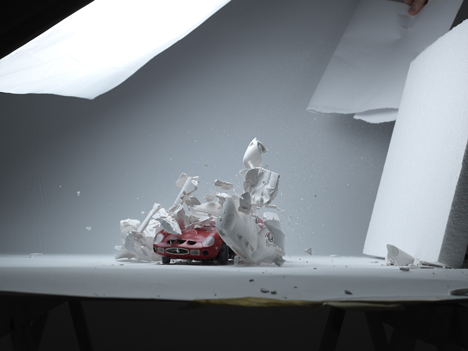
Fabian says: "I have always been fascinated by the clean, crisp looks of 3D renderings. So I tried to use that certain type of aesthetic and combine it with the strength of real photography. These images are also about capturing time: either in stopping it as in the Hatch series or inventing it as in the Disintegrating series." Fabian Oefner’s artwork will be on show at the M.A.D. Gallery in Geneva starting on 27 November until May 2014. Disintegrating in detail Fabian Oefner explains that photography usually captures moments in time; but his Disintegrating series is all about inventing a moment in time. "What you see in these images, is a moment that never existed in real life," says Oefner. "What looks like a car falling apart is in fact a moment in time that has been created artificially by blending hundreds of individual images together. There is a unique pleasure about artificially building a moment… Freezing a moment in time is stupefying."
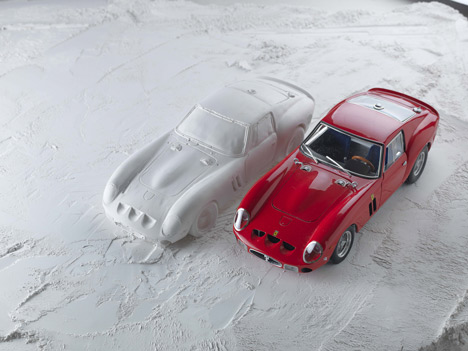
The images show exploded views of classic sports cars: intricate scale models of an eye-wateringly beautiful Mercedes-Benz 300 SLR Uhlenhaut Coupé with gullwing doors (1954); an iconic sleek, black Jaguar E-Type (1961); and a curvaceously sensual Ferrari 330 P4 (1967). Fabian first sketched on paper where the individual pieces would go, before taking apart the model cars piece by piece, from the body shell right down to the minuscule screws. Each car contained over a thousand components. Then, according to his initial sketch, he placed each piece individually with the aid of fine needles and pieces of string. After meticulously working out the angle of each shot and establishing the right lighting, he photographed the component, and took thousands of photographs to create each Disintegrating image.
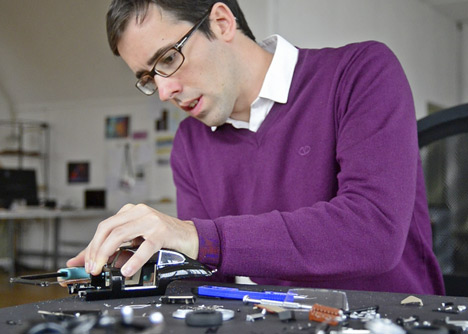
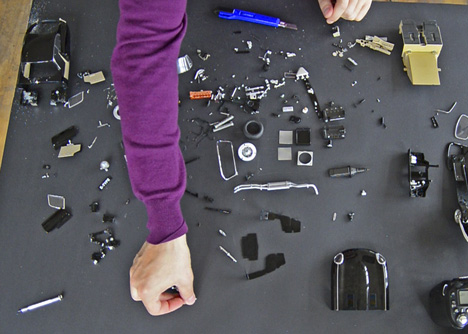 Fabian started by making a latex mould from the model car, which was then filled with a thin layer of gypsum to create the shell. Several dozens of these shells were made in order to complete the next step: smashing the shell onto the car to create the illusion of the vehicle breaking out. This step had to be repeated a great many times until the desired results were achieved. To capture the very moment where the shell hit the model, Fabian connected a microphone to his camera, a Hasselblad H4D, and flashes, so that every time the shell hit the surface of the car, the impulse was picked up by the microphone which then triggered the flashes and the camera shutter. Representing a car as a living, breathing organism that has been gestated is a neat twist on car conception; it could be said Hatch is to the automotive world what a stork is to delivering babies.
Fabian started by making a latex mould from the model car, which was then filled with a thin layer of gypsum to create the shell. Several dozens of these shells were made in order to complete the next step: smashing the shell onto the car to create the illusion of the vehicle breaking out. This step had to be repeated a great many times until the desired results were achieved. To capture the very moment where the shell hit the model, Fabian connected a microphone to his camera, a Hasselblad H4D, and flashes, so that every time the shell hit the surface of the car, the impulse was picked up by the microphone which then triggered the flashes and the camera shutter. Representing a car as a living, breathing organism that has been gestated is a neat twist on car conception; it could be said Hatch is to the automotive world what a stork is to delivering babies.